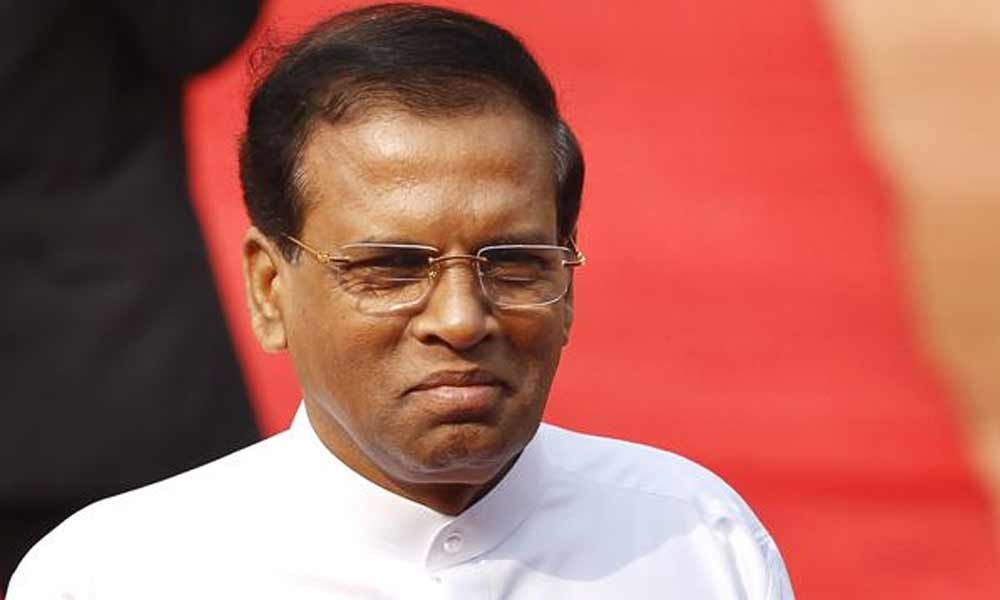Live
- ACB hands over key documents to ED in the Formula E car race case
- How to Use Meta AI on WhatsApp for Creative Interactions
- FIIs remain net investors in India this year amid robust economy, resilient market
- Telangana government grants extended timings for pubs and parties on the eve
- Beed sarpanch murder: Kin, Maha Oppn parties, social groups take out silent march
- UAE Tops Global Mobile Internet Speeds; India Ranks 25th Worldwide
- Over one third Americans take on debt in holiday spending: Survey
- Climate change risks impacting financial system, need India-specific data: RBI’s Rajeshwar Rao
- Nitish Kumar Reddy is a star of Indian cricket, says Sunil Gavaskar
- Winter Hydration Made Easy: 5 Essential Tips to Stay Healthy
Just In

It was not clear if other ministers from the main Muslim party, Sri Lanka Muslim Congress, would return to the fold.
COLOMBO: Two of the nine Sri Lankan Muslim ministers, who had resigned in the wake of growing anti-minority sentiments following the Easter Sunday bombings, returned to the government fold on Wednesday, days after the country's chief Buddhist prelate urged them to reconsider the decision.
Kabir Hashim and AHM Haleem were sworn-in as ministers by President Maithripala Sirisena.
The development came a day after a meeting of the Muslim ministers to reconsider their positions ended inconclusively.
Both Hashim and Haleem are from the United National Party (UNP) of Prime Minister Ranil Wickremesinghe.
It was not clear if other ministers from the main Muslim party, Sri Lanka Muslim Congress, would return to the fold.
Along with the nine ministers, two provincial governors from the minority community also resigned on June 3 to allow the Lankan government to investigate allegations against some of them on links to an Islamist extremist group blamed for the deadly terror attacks that claimed 258 lives, including 11 Indians, and injured nearly 500.
They had also protested what they term the government's inability to ensure the safety of their community which constitute nine per cent of the island's 21 million population.
The Muslim-owned properties and businesses were attacked by mobs and the Muslim ministers claimed that the minority community was facing arbitrary arrests on certain occasions.
A Muslim Cabinet minister and two provincial governors were accused of having sponsored the National Thowheeth Jamaath (NTJ) blamed for the attacks.
Meanwhile, a parliamentary probe was told that the Muslim clerics in the eastern Kathankudi area foresaw the Islam radicalism and had forewarned the political leadership as far back as 2017.
Moulavi Sahlan told the Parliamentary Select Committee (PSC) that Sufi Islamic leaders in Kathankudi had informed the President's office, Prime Minister's Office and Attorney General's Department and the police chief about "the growing radicalism".
He said that Zahran Hashim, the leader of the NTJ -- the banned outfit blamed for the attacks on three Colombo hotels and three churches -- had asked them not to commemorate Christmas in 2016.
The former chief of the Kathankudi Police Ariyabandu Wedagedara said that he had not received any complaints on Zahran's extremism.
Yet there had been sectarian clashes in the area.
Sirisena wanted the halt to proceedings of the PSC appointed by Assembly Speaker Karu Jayasuriya to probe the events leading to the attacks.
He had threatened not to reconvene the Cabinet until the government abandoned the select committee process.
Sirisena claimed that the committee proceedings were aimed at putting the blame of the attacks on him being the Defence Minister for the intelligence failure.
There are 19 Muslims lawmakers in the 225-member Parliament and nine of them held Cabinet, state and deputy ministerial positions.
India had shared intelligence inputs with Sri Lanka about possible attacks weeks before the bombings.
Nine suicide bombers carried out a series of devastating blasts that tore through St Anthony's Church in Colombo, St Sebastian's Church in the western coastal town of Negombo and another church in the eastern town of Batticaloa, and three high-end hotels frequented by tourists in the country's deadliest violence since the devastating civil war with the Liberation Tigers of Tamil Eelam (LTTE) ended in 2009.
The Islamic State claimed the attacks, but the government blamed local Islamist extremist group National Thawheed Jamaath for the attacks.

© 2024 Hyderabad Media House Limited/The Hans India. All rights reserved. Powered by hocalwire.com







